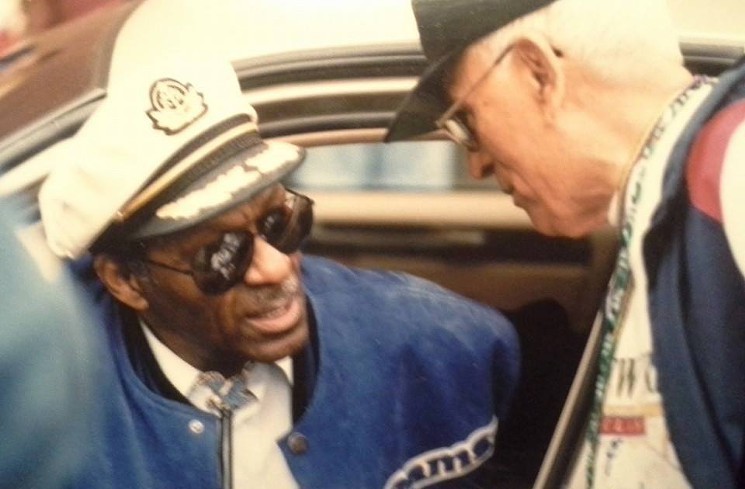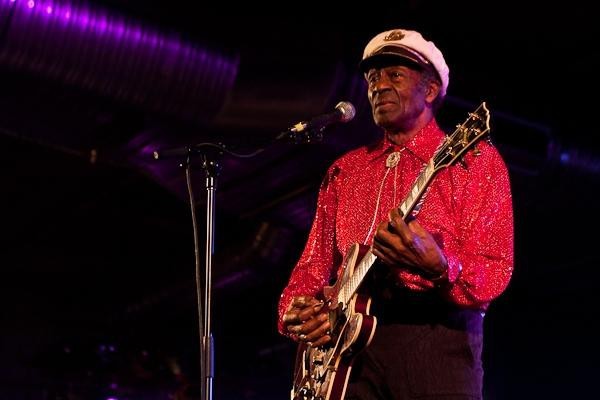But Berry, who was 90, was in many ways this unruly genre’s architect: the guy whose late-’50s stories about teenage kicks, fast cars and faster girls came packaged one three-chord burst of guitar glory after another, and whose combination of insolence and glee became every true rocker’s default attitude ever since.
Chuck Berry was rock's greatest practitioner, guitarist, and the greatest pure rock 'n' roll writer who ever lived.
— Bruce Springsteen (@springsteen) March 18, 2017
If rock and roll eventually outgrew Berry’s influence, for better or worse, it has yet to eclipse his impossibly long shadow. Just listen to the tributes that have poured in since after his death. Bruce Springsteen wrote, “Chuck Berry was rock’s greatest practitioner, guitarist, and the greatest pure rock ’n’ roll writer who ever lived.” Former president Barack Obama added, “Chuck Berry rolled over everyone who came before him – and turned up everyone who came after.”Chuck Berry rolled over everyone who came before him – and turned up everyone who came after. We'll miss you, Chuck. Be good.
— Barack Obama (@BarackObama) March 19, 2017
The Rolling Stones are deeply saddened to hear of the passing of Chuck Berry. He was a true pioneer of rock'n'roll & a massive influence. pic.twitter.com/RT4NZH3KeQ
— The Rolling Stones (@RollingStones) March 18, 2017
He lit up our teenage years, and blew life into our dreams of being musicians and performers. 2/3 #ChuckBerry
— Mick Jagger (@MickJagger) March 18, 2017
His lyrics shone above others & threw a strange light on the American dream. Chuck you were amazing&your music is engraved inside us forever
— Mick Jagger (@MickJagger) March 18, 2017
The Rolling Stones, the group that (arguably) bears Berry’s deepest influence and carried it to its greatest commercial heights, were full of praise for a man who in many ways could be considered their mentor. As a band, they tweeted, “The Rolling Stones are deeply saddened to hear of the passing of Chuck Berry. He was a true pioneer of rock’n’roll & a massive influence.” Singer Mick Jagger added, “He lit up our teenage years, and blew life into our dreams of being musicians and performers. His lyrics shone above others & threw a strange light on the American dream. Chuck you were amazing & your music is engraved inside us forever.” Guitarist Keith Richards, though, simply said, “One of my big lights has gone out.”"One of my big lights has gone out.”
— Keith Richards (@officialKeef) March 19, 2017
- Keith, 3/18/17 pic.twitter.com/I86dHlvN5W
Eight years before Back to the Future revived the song for ‘80s kids, a recording of “Johnny B. Goode” was included in the “Golden Records” archive NASA sent into deep space via the two Voyager capsules. Berry’s fortunes, though, eventually fell back to Earth. Undone by a combination of his own well-documented misdeeds, unfortunate record deals and popular tastes that inevitably moved on — though disciples like Richards and Springsteen and the E Street Band remained champions of his music to the very end — Berry spent much of his later decades playing with local pickup bands for whatever promoter would put up the money, up front. However, he also faithfully held down a residency at St. Louis restaurant/bar Blueberry Hill that only ended when he retired from performing in 2014.
The Houston Press reviewed Berry, then age 84, at Nutty Jerry’s in Winnie in March of 2011. The years had not been kind: “One million artists and groups would follow him, but now not even the man himself could hold one of those songs up to the same quality as the day he recorded them,” Craig Hlavaty wrote.
Thirteen years earlier, the outcome was much happier. Berry was recruited by longtime Houston promoter Don Gomez to play Galveston’s Mardi Gras in February 1998. Allen Oldies Band front man Allen Hill, who played bass at the gig, remembers Gomez telling him Berry had asked for “a band that’ll do their homework and take this seriously.” Aiming to meet the challenge, Hill says, he and his bandmates (fellow members of Banana Blender Surprise and the El Orbits at the time) learned about 100 of Berry’s songs and hoped for the best.
"If you're a musician and you don't know Chuck Berry songs, you're in the wrong business!" Houston Continental Club owner Pete Gordon, pounding the piano that day, told the Houston Press in 2006. "You have to know them!"

Berry did eventually go onstage, but complicating matters further was his insistence on working without a set list and often spontaneously changing a song to a different key, Hill recalls. The gig, he adds, “worked out great — one of the highlights of my career, absolutely.” He remembers it today as “3,600 seconds of maximum rock and roll,” and the “super-spry” Rock and Roll Hall of Famer, then just entering his seventies, even doing his signature duckwalk across the stage.
Not that the gig was easy. Berry was a notoriously strict bandleader, and Hill had made the mistake, he remembers, of trying to learn the bass parts as played by legendary Chicago bassist Willie Dixon on Berry’s original recordings. “Chuck was furious with me; it was really powerful,” Hill says. Once he realized what Berry wanted him to play — basically the root note of every chord — Hill says Berry smiled at him and said, “That sounds so good!”
Afterwards, in the open-air tent that passed for a green room, Hill says, Berry acted appreciative of his band — “which I understand [was] something of a rarity” — and that the then-septuagenarian rocker was “totally blown away” by Gordon's piano skills; Hill says Berry praised Gordon’s talents as “exactly how that instrument should be played.” But even that wasn’t enough for Berry to take a picture with his star-struck band, adds Hill.
“I’m sure someone took a picture of Chuck drinking his orange juice alone in that tent,” he laughs.
In early 2006, Hill almost got to do an encore. He and many of the same players from the Galveston show were contacted by Berry’s people and retained for a show at Austin’s Paramount Theater. An all-Berry rehearsal the night before at the Big Top was great fun, Hill remembers, but when he and his bandmates reached the Paramount, they learned that by then Berry had begun bringing some musicians on the road with him, including in this case a bass player. (Bob Ruggiero's account for the Press, published shortly after the Paramount show, goes into much greater detail.)
Despite being “super bummed out,” Hill admits, he watched the show from the side of the stage and eventually wound up in the green room. When he heard the announcer call for the crowd to give it up for Chuck Berry, Hill says he looked up just in time to see Berry walk past him in the hallway, still playing his guitar through a wireless pickup, in what amounted to a private audience with one of rock and roll’s founding fathers.
“He just gave me the coolest smile,” Hill says, “and that’s when I finally got to shake his hand.”




